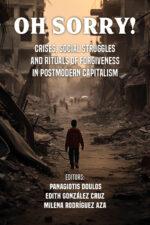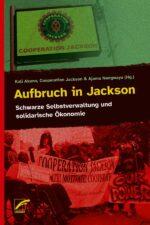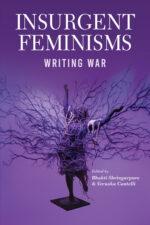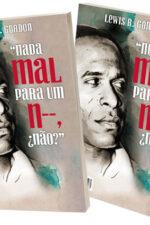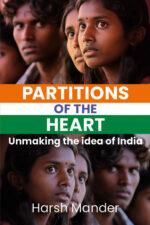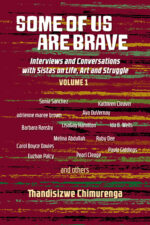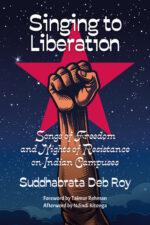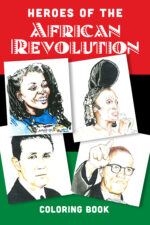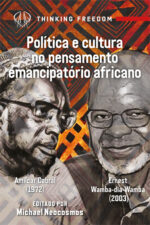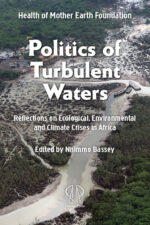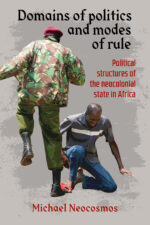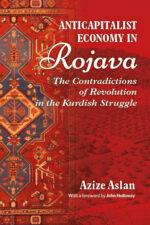-
Oh, Sorry! Rituals of Forgiveness, Crises and Social Struggles in Postmodern Capitalism
As the world grapples with the legacy of crimes of enslavement, colonialism, genocide and mass killings, imprisonment and murder of children, attempts at eliminating cultures and history of Indigenous peoples, looting and other crimes against humanity, the performance of public atonement has become increasingly prevalent. Apologies from state actors and institutions are issued in solemn ceremonies, often acknowledging the collective guilt for historical atrocities. Despite the solemnity of these events, there is a growing scepticism surrounding the sincerity of these apologies, particularly when they are not accompanied by tangible reparations, healing, reconciliation or systemic change. This scepticism is rooted in a perception that these acts of contrition are sometimes less about making amends to the aggrieved and more about assuaging the guilt of the aggressors and maintaining the status quo, providing the illusion of progress without the substance.
In this compelling work, Oh, Sorry! Rituals of Forgiveness, Crises and Social Struggles in Postmodern Capitalism, the authors unveil the complex interplay between public apologies, social justice and popular mobilisations. They argue that these acts of contrition while heralding unresolved histories into the public eye, serve as battlegrounds where the definitions of truth and the contours of historical memory are fiercely contested. This collection of essays illuminates the paradoxical nature of these rituals, positing that rather than catalysing transformative change, they simply cement the prevailing societal structures, emboldening states to persist in their destructive paths under the guise of remorse. Such apologies often precede an expected forgetfulness, rendering truth a malleable tool to compartmentalise the past as a distant occurrence, not an ongoing narrative. The discourse laid out in these essays emphasizes the tension inherent in the act of forgiveness—an act that, within the established framework, demands that the state remain unchallenged, wielding the power to decree what should or should not be forgiven.
The editors of this book did not intend this to be a comprehensive treatise on the rituals of forgiveness: the chapters are devoted primarily to the experiences of Latin America, particularly of Mexico, Guatemala, Chile, and Brazil. But there is also a chapter on the struggles for Palestine — so relevant in the face of the current genocidal invasion by the Zionist State of Israel into Gaza, the world’s largest and most densely populated concentration camp. Nithya Nagarajan explores the ongoing plight of Palestinians since the Nakba in 1948, and event that, for over 75 years, has not only subjected Palestinians to severe hardships but has also seen their resistance and struggle for liberation being ideologically effaced by Israeli and mainstream media efforts, portraying Palestinians as victims rather than agents of revolution.
Forward by Firoze Manji
Introduction
One
Rituals of Forgiveness: The Performance of State Violence in the Context of Crisis by Panagiotis Doulos & Edith González Cruz
Two
From Forgiveness to Permission: The State and “the Indigenous” in the Face of Planetary Collapse by Ines Durán Matute.
Three
End(s) of Forgiveness by Minas Vlachos
Four
The Fierce Dispute for Memory, Truth and Justice in Guatemala by Carlos Figueroa Ibarra.
Five
Never Again? A Critique of Narratives of Forgiveness and Reconciliation in Post-dictatorial Chile by Roberto Longoni Martínez.
Six
Rituals of Forgiveness as a Political Strategy of the Capitalist State: The Brazilian Case of “O Amor Venceu” in Lula’s Victory in 2022 by Leonardo Carnut, Lúcia Dias da Silva Guerra & Áquilas Mendes.
Seven
The No-bodies: Between Forgiveness and Overflow. Notes Against Forgiveness as a Dispositive of Control in Times of Explicit Antagonism by Milena Rodríguez Aza.
Eight
The March of Return: Struggle for Palestinian Liberation in the Unfinished Nakba by Nithya Nagarajan.
-
Aufbruch in Jackson [German edition of Jackson Rising: Black self-management and solidarity economy]
USD $ 24.00German translation of Jackson Rising: The Struggle for Economic Democracy and Black Self-Determination in Jackson, MississippiHow black activists are building liberation practically from below: Departure in Jackson documents the history of one of the most exciting revolutionary experiments in the USA Present.
Since the 1970s, black liberation movements in majority-black Mississippi have taken change into their own hands. The Deep South should become the center of their independence – “Free the Land!” In the 2010s, the election of Chokwe Lumumba as mayor in the capital Jackson took an important step towards implementing the vision of assembly democracy, solidarity economy and an end to racial inequality. Lumumba dies unexpectedly in 2014, but his son Antar and the Cooperation Jackson continue to move forward.
We learn about the pitfalls of radical local politics and struggles for housing and land, democratic economic models and ecology, internationalist solidarity and the parallels to the Rojava Revolution and the Zapatistas, about encouraging experiences in which different concerns go hand in hand.
-
Insurgent Feminisms: Writing War
War is never just the war itself, it’s not the event or the epoch. War is the impossible and unending afterlife, the struggle to breathe after being bludgeoned, and the re-situating of one’s self and of one’s place after displacement and fragmentation.
Insurgent Feminisms: Writing War advances a new paradigm of war writing by focusing on gender. War is always fought upon the backs of women, often under the pretense of saving them. Yet, along the way, the brutalities unleashed on women during wartime remain relentless. In this collection, insurgency emerges in the raw and meticulous language of witnessing, and in the desire to render the space of conflict in radically different ways. These feminist and queer perspectives on war come out of regions and positions that disobey the rules of war writing. Comprising reportage, fiction, memoir, poetry, and conversations from over sixty writers, the collection includes contributions by Chika Unigwe, Nathalie Handal, Ubah Cristina Ali Farah, Suchitra Vijayan, Bélen Fernández, Uzma Falak, Otoniya Juliane Okot Bitek, Sarah Ladipo Manyika, Lara Pawson, Gaiutra Bahadur, Robtel Neajai Pailey, Sumana Roy and Lina Mounzer, among several others.
Bhakti Shringarpure co-founded Warscapes magazine in November 2011 and it has now transitioned into the Radical Books Collective.
Veruska Cantelli is a writer, translator, editor, and Associate Professor of Interdisciplinary Studies at Champlain College in Vermont, USA.
Insurgent Feminisms is refreshingly bold and emotive, pulling at the heartstrings —and a rich literary delight to boot. As you turn the pages, you will be enlightened, awed, triggered, outraged, guilt-tripped… Diverse women from the global South gift us the rare privilege to glimpse into the incredibly minute details of their experiences of literal and metaphorical wars; they break exciting new ground in knowledge production. The book jolts you out of the narrow focus of your existence and reminds you of the amazing power of women’s resilience. What a gem! – Sylvia Tamale, Decolonial feminist scholar, Uganda
Crimes against humanity, war crimes and their justification through imperial-racist civic and state action are not as distant as we would like to believe. Resistance, hope, and the tenacious will to return, too, survive in the most unimaginable ways. Insurgent Feminisms drives this point home in searing, poignant re-tellings from across the world. – Kalpana Kannabiran, author, sociologist and legal scholar, India
-
“Nada mal para um N—, Não?” “No está mal para un N—, ¿no?”
Escrito durante as comemorações do septuagésimo quinto aniversário da publicação de Black Skin, White Masks (“Pele Negra, Máscaras Brancas”), de Frantz Fanon, “Not Bad for a N—, No?” oferece reflexões sobre as circunstâncias da publicação desta obra clássica com os insights de Fanon sobre o que ele chamou de tentativa de “assassinato do homem” e a necessidade urgente de a humanidade se tornar “acional”.
Escrito durante las celebraciones del septuagésimo quinto aniversario de la publicación de Black Skin, White Masks (“Piel negra, máscaras blancas”) de Frantz Fanon, “Not Bad for a N—, No?” ofrece reflexiones sobre las circunstancias de la publicación de esta obra clásica con las ideas de Fanon sobre lo que llamó el intento de “asesinato del hombre” y la urgente necesidad de que la humanidad se vuelva “acción”.
-
Afro-Asian Poetry that Changed the World

“It is unclear when ‘Lotus’, a literary magazine of progressive Afro-Asian writers largely funded by the USSR, published its last issue after a successful run spanning two decades (1968-1991); but it was certainly a voice of the Palestinian people.
Professor Tariq Mehmood Ali teaches English at the American University of Beirut and is an award-winning novelist and a documentary filmmaker. A few years ago, he launched a project to restore the magazine’s legacy. The project involves curating, saving, preserving, and digitizing old issues, offering historical depth to the Palestine movement and potentially making the magazine accessible to a new generation of readers from Palestine and the rest of the Global South.
“‘Lotus’ resolutely opposed Zionism, seeing it as a racist tool of imperialism,” says Prof Ali, who has pored over innumerable issues of the magazine. He suggests that Palestinians would not have had such a raw deal if the publication was still in circulation.
‘Lotus’ championed the cause of the Palestinian Liberation Operation (PLO) and even passed a resolution on Palestine at its third Afro-Asian conference held in Beirut (1970-71). These and other details find mention in Prof Ali’s book ‘Afro-Asian Poetry that Changed the World’, scheduled for a spring 2024 release.
‘Lotus’ was a trilingual quarterly magazine published in Arabic, English and French – and then translated into numerous languages of formerly colonized countries.
“The writers of ‘Lotus’ as well as the journal itself had a huge cultural impact at the time, affecting tens of millions of people. This was the first time writers of Africa and Asia were able to talk to each other, across their vast continents, outside the prism of their colonial and imperial usurpers,” says Prof Ali, who is currently busy digitizing and archiving the magazine. …
Some of the prominent writers who contributed to ‘Lotus’ included Youssef El Sebai, Abdel Aziz Sadek, Edward El Kharrat (Egypt), Mouloud Mammeri (Algeria), Mulk Raj Anand (India), Hiroshi Noma, (Japan), Dr Soheil Idriss (Lebanon), Sononym Udval (Mongolia), Faiz Ahmed Faiz (Pakistan), Mario De Andrade (Portuguese Colonies), Mohamed Soleinian (Sudan), Alex La Guma (South Africa), Anatoly Sofronov (USSR), Adonis (Lebanon) and Mahmoud Darwish (Palestine).
The magazine instituted the Lotus Prize and among its recipients were Pakistan’s Faiz Ahmed Faiz and India’s Harivansh Rai Bachchan (whose son Amitabh is a well-known actor). Translation bureaus were launched in many countries of the two continents – so that people could read each other’s works.
By Lamat Hasan, an independent journalist based in Delhi.
-
Política e cultura no pensamento emancipatório africano
A atual ausência de uma visão emancipatória para a África está no centro dos nossos problemas políticos relacionados à opressão racial capitalista e colonial. Qualquer tentativa de repensar a emancipação política no continente africano deve ser capaz de localizar uma concepção universal de liberdade no interior das experiências culturais singulares que as pessoas vivem. Quando esteve baseada nas tradições populares, a política emancipatória exibiu tais traços dialéticos, independentemente da maneira específica na qual cada luta pela liberdade foi pensada em diferentes contextos históricos. No entanto, apenas alguns intelectuais militantes compreenderam a importância dessa dialética no pensamento. O presente volume esboça e discute dois pontos de vista particularmente importantes sobre o papel e a relevância da cultura popular na política emancipatória em África. Cada um deles resulta de formas distintas de exploração capitalista e colonialista: o primeiro viu a luz do dia em um contexto colonial, enquanto o segundo é diretamente confrontado pelo estado neocolonial. Todas as políticas emancipatórias são desenvolvidas em confronto com o poder estatal, e todas começam com um processo de discussão e debate através do qual um sujeito coletivo começa a se formar. No continente africano, a construção de tal sujeito político coletivo tem sido informada, de maneira fundamental, pelas culturas populares. Os dois autores cujos ensaios estão aqui incluídos entenderam isso e colocaram a cultura popular no centro de suas políticas. O primeiro, Amílcar Cabral, aborda o papel central da cultura popular na luta pela independência da Guiné-Bissau nos anos 1970; o segundo, Ernest Wamba-dia-Wamba, aborda a centralidade da cultura popular africana para uma política emancipatória endereçada à atual República Democrática do Congo. Apesar das décadas que os separam, tanto Cabral como Wamba-dia-Wamba desenvolvem, no centro de sua política, uma dialética que ativa os universais da cultura no presente. É essa característica que confere às suas visões uma importância central para o pensamento emancipatório contemporâneo.
-
Domains of politics and modes of rule : Political structures of the neocolonial state in Africa
USD $ 10.00“A concise, dense and illuminating dissection of the workings of the post-independence African state that also charts a path towards imagining and working for a true politics of liberation.” — Ndongo Samba Sylla, Senior Researcher, Rosa Luxemburg Foundation.
This is a brief attempt to orient the study of the neocolonial state in Africa through an assessment of the manner in which it rules its people. It is argued that the state produces different modes of rule by deploying different politics over different parts of the population. In this manner, it can combine a genuinely democratic rule in the image of the West over some while subjecting the majority to colonial forms of domination. Imported political subjectivities from the West and its obsession with human rights discourse are reserved largely for a sphere of civil society in which the right to have rights is conferred upon citizens. In the domains of uncivil society and ‘traditional’ society, the right to rights is not observed by the state so different subjectivities, regularly including violence, govern the manner political problems and solutions are addressed both by the state and by people. In consequence, distinct political subjectivities prevail in the conceptualization of popular resistance in all three domains, and it becomes difficult to rally such different concerns and conceptions within an overall anti-neocolonial struggle.∴ -
Slave King: Rebels against empire: A Novel
A fictionalised account of a slave rebellion in Roman Sicilia more than sixty years before Spartacus, it tells the story of the slave Younis from Afamia (now in Syria), a mystic and seer who led a great uprising sustained much longer than Spartacus’s. As with Messinian rebellion against Spartan oppression centuries earlier, the West has been slow to take such events seriously and reinstate their presence in popular culture as expressions of human spirituality and resistance. The role of seers as leaders is reminiscent of Ayi Kwei Armah’s The Healers on ancient Africa. This book is a fascinating and brilliant telling of popular struggle. It is a minor classic.— Michael Neocosmos, Emeritus Professor in Humanities, Rhodes University, South Africa, author of Thinking Freedom; Towards a theory of emancipatory politics
I highly recommend Basem Ra’ad’s compelling and deeply researched historical novel about the fire-breathing Syrian slave who challenged Roman might in the second century BCE, seeking independence for his thousands of followers. This little-known story of resistance deserves wide attention … an amazing and important story. — Adrienne Mayor, Department of Classics, Stanford University, author, The Poison King: The Life and Legend of Mithradates, Rome’s Deadliest Enemy
What Basem L. Ra’ad has done in this remarkable novel about slave uprisings is to demonstrate how ‘the history of all hitherto existing society is the history of class struggles.’ He shows why the dominant discourse needs to be revised. A moving story that casts light on many strifes in our times. — Tariq Mehmood, author, Song of Gulzarina, Associate Professor, American University of Beirut
Slave King disrupts two millennia of malign stories about one of antiquity’s original slave revolts. Not cannibals, not demons, but slaves, farmers and herdsmen created a kingdom of equality and compassion. In vivid prose and deep knowledge, Ra’ad re-imagines freedom emerging from Mediterranean multicultural shores. It is a profound re-creation of history in thrilling fiction. —Hilton Obenzinger, author of Witness 2017-2020 and American Palestine: Melville, Twain, and the Holy Land Mania
Slave King recreates a major slave revolt in Sicily led by a Syrian magus turned leader, circa 140-132 BCE, decades before Spartacus. He forges a coalition of slaves, farmers and herders to defeat Roman legions and establish an egalitarian entity. The novel uses biased ancient sources but challenges them to speak for the oppressed and provide alternative cultural-historical perspectives relevant to the present. Among its chapters are scenes of exorcism, crucifixion, ancient marriage customs, a play, and several battles.

